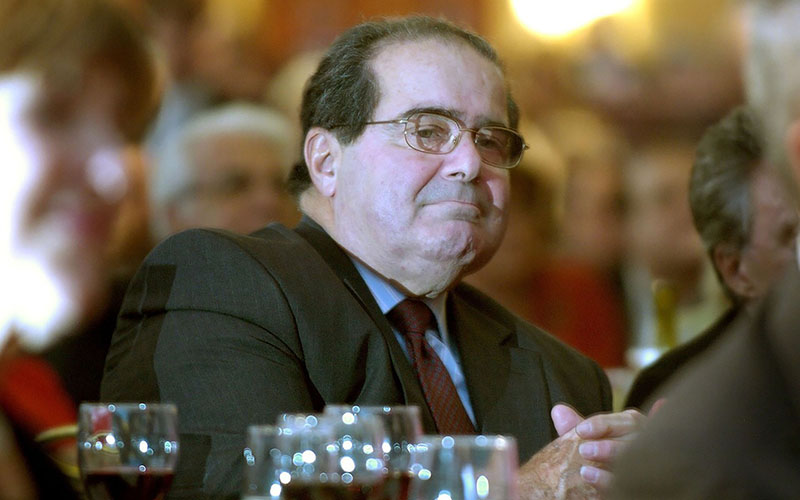
Supreme Court Justice Antonin Scalia at the 2006 National Italian American Foundation event in Washington. Scalia’s death Saturday has sparked a debate on how soon a successor should be named. (Photo by Jonathan Ernst/Reuters)
WASHINGTON – Washington officials may be arguing over what will follow the sudden weekend death of Supreme Court Justice Antonin Scalia, but to Phoenix resident David Plummer the answer is obvious – the president should nominate a replacement, and quickly.
“He has the constitutional duty to do so as promptly as possible,” said Plummer, one of dozens of Arizonans who responded to a Public Insight Network query on what should happen in the wake of Scalia’s death.
Share your thoughts:
How would you handle the Supreme Court vacancy?
U.S. Supreme Court becomes a court divided after death of Justice Antonin Scalia
Republicans in the Senate, which would have to confirm a Supreme Court nominee, have said that President Barack Obama should not nominate a justice – a lifetime appointment – in the last year of his presidency.
“I believe that we should wait until after the next election and let the American people pick the next president,” said Sen. John McCain, R-Arizona, in an interview broadcast on KFYI. He said it is more appropriate that the Senate “should consider who the next president of the United States nominates.”
He was echoing a sentiment that Republican presidential candidates voiced over the weekend, when they urged Obama to delay the nomination until after the election. Some took it a step further, saying the Senate would reject any Obama nominee, with Senate Majority Leader Mitch McConnell saying the vacancy “should not be filled until we have a new president.”
But Obama said Saturday that he plans to put forward a candidate this year, adding that there “is plenty of time” for him to nominate a successor and for the Senate to hold hearings and vote on Scalia’s replacement.
Many of those who responded to the PIN query agreed with the president.
“The people gave him that power and responsibility when they elected him to be president of the United States,” said Plummer, 43, who described himself as an independent. “This power doesn’t go away just because the other party finds the situation to be less than favorable timing.”
Others were like William Wingert, who said a nomination now would be pointless, since the Republican-controlled Senate would have to confirm.
“It is likely to be an exercise in futility if he does,” said Wingert, 56, a Libertarian from Phoenix. “Obama would take the higher road by standing down or at worst waiting until November and let the new Congress deal with it.”
But the death of Scalia, a conservative force on the bench, leaves the court ideologically split between conservatives and liberals, which some said makes a nomination even more urgent, even if Obama is a “lame duck.”
Most PIN respondents said that it is the Senate’s duty to at least consider a nominee, rather than stalling until the next president is in office, as many fear they will.
“Once the president nominates a replacement to Justice Scalia, it is the constitutional duty of the Senate to take up the nomination,” Plummer said. “Simply because the party in control of the Senate doesn’t like the president is not a sufficient reason to neglect the duty to consider the nomination.”
One respondent even suggested that if the Senate failed to act, it could drive Republicans like her to vote Democratic in the general election.
“For over 40 years, I have been a registered Republican. I’m finding it harder and harder to vote for such an unprincipled group of electors,” said Cindi Valgento, 61.
“If the Republican-controlled Senate fails to confirm a nominee just because a Democrat president nominated him, people will be outraged by the utter contempt for the American people,” said Valgento, an Apache Junction resident. “This will increase votes for the Democrat nominee.”
Most respondents said, though, that Scalia’s death does not change their feelings toward the election.
“Supreme Court vacancies have always been a consideration in every presidential race I have voted,” said Jim Leemann, 69.
“The age and health of the justices should be on the minds of all Americans when they vote, especially in light of Supreme Court justices being lifetime appointments,” said Leemann, who described himself as a conservative.
Of the few who said the death does change their feelings, most said it just made them feel more strongly about their preferred parties.
“It makes it imperative that the candidate of my choice now is elected to the presidency,” said Cornelia Honchar, a 73-year-old Arizona Democrat. “Therefore, I am committed to working much harder for my candidate now.”
EDITOR’S NOTE: Sources in the Public Insight Network informed the reporting in this story through a partnership with the Cronkite PIN Bureau. To send us a story idea or learn more, click here.